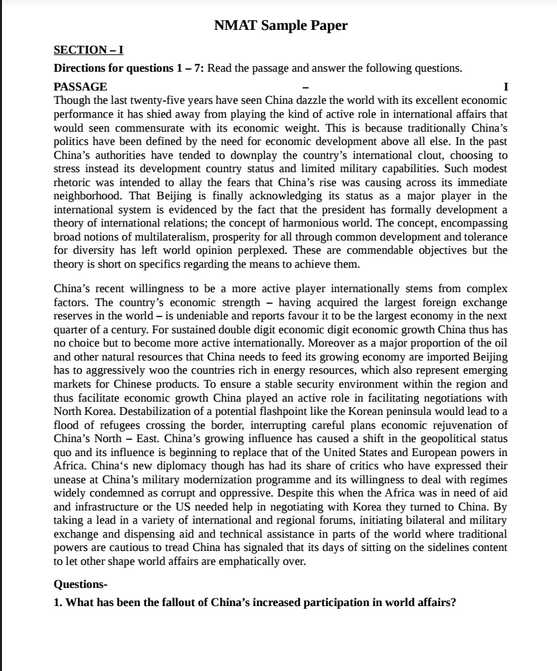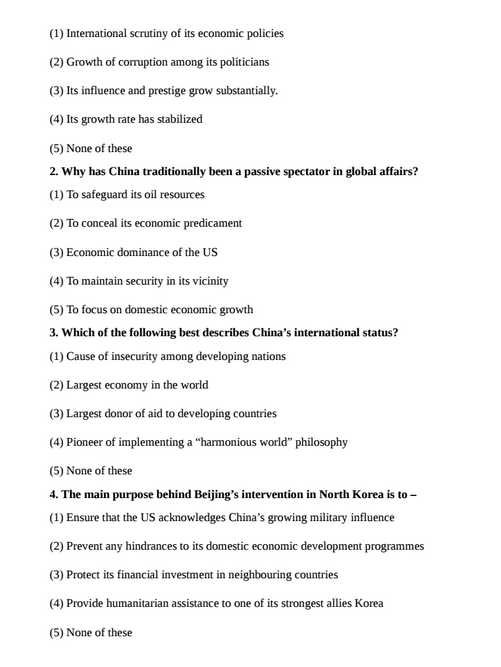|
#2
30th November 2016, 01:20 PM
| |||
| |||
| Re: Previous Year Question Papers of NMAT
As you are looking for previous year question paper of NMAT Entrance Exam, so here I am providing following papers: NMAT Previous Year Question Paper 1 SECTION – I Directions for questions 1 – 7: Read the passage and answer the following questions. PASSAGE – I Though the last twenty-five years have seen China dazzle the world with its excellent economic performance it has shied away from playing the kind of active role in international affairs that would seen commensurate with its economic weight. This is because traditionally China’s politics have been defined by the need for economic development above all else. In the past China’s authorities have tended to downplay the country’s international clout, choosing to stress instead its development country status and limited military capabilities. Such modest rhetoric was intended to allay the fears that China’s rise was causing across its immediate neighborhood. That Beijing is finally acknowledging its status as a major player in the international system is evidenced by the fact that the president has formally development a theory of international relations; the concept of harmonious world. The concept, encompassing broad notions of multilateralism, prosperity for all through common development and tolerance for diversity has left world opinion perplexed. These are commendable objectives but the theory is short on specifics regarding the means to achieve them. China’s recent willingness to be a more active player internationally stems from complex factors. The country’s economic strength – having acquired the largest foreign exchange reserves in the world – is undeniable and reports favour it to be the largest economy in the next quarter of a century. For sustained double digit economic digit economic growth China thus has no choice but to become more active internationally. Moreover as a major proportion of the oil and other natural resources that China needs to feed its growing economy are imported Beijing has to aggressively woo the countries rich in energy resources, which also represent emerging markets for Chinese products. To ensure a stable security environment within the region and thus facilitate economic growth China played an active role in facilitating negotiations with North Korea. Destabilization of a potential flashpoint like the Korean peninsula would lead to a flood of refugees crossing the border, interrupting careful plans economic rejuvenation of China’s North – East. China’s growing influence has caused a shift in the geopolitical status quo and its influence is beginning to replace that of the United States and European powers in Africa. China‘s new diplomacy though has had its share of critics who have expressed their unease at China’s military modernization programme and its willingness to deal with regimes widely condemned as corrupt and oppressive. Despite this when the Africa was in need of aid and infrastructure or the US needed help in negotiating with Korea they turned to China. By taking a lead in a variety of international and regional forums, initiating bilateral and military exchange and dispensing aid and technical assistance in parts of the world where traditional powers are cautious to tread China has signaled that its days of sitting on the sidelines content to let other shape world affairs are emphatically over. Questions- 1. What has been the fallout of China’s increased participation in world affairs? (1) International scrutiny of its economic policies (2) Growth of corruption among its politicians (3) Its influence and prestige grow substantially. (4) Its growth rate has stabilized (5) None of these 2. Why has China traditionally been a passive spectator in global affairs? (1) To safeguard its oil resources (2) To conceal its economic predicament (3) Economic dominance of the US (4) To maintain security in its vicinity (5) To focus on domestic economic growth 3. Which of the following best describes China’s international status? (1) Cause of insecurity among developing nations (2) Largest economy in the world (3) Largest donor of aid to developing countries (4) Pioneer of implementing a “harmonious world” philosophy (5) None of these 4. The main purpose behind Beijing’s intervention in North Korea is to – (1) Ensure that the US acknowledges China’s growing military influence (2) Prevent any hindrances to its domestic economic development programmes (3) Protect its financial investment in neighbouring countries (4) Provide humanitarian assistance to one of its strongest allies Korea (5) None of these 5. Which of the following CANNOT be said about China’s international relations theory? (1) The theory is ambiguous in nature (2) The theory reflects China’s realization that it occupies a vital place in global affairs (3) It promotes the concept of common development for all nations (4) It is a theory which explains China’s sustained growth rate (5) It emphasizes achieving prosperity through universal development.   |